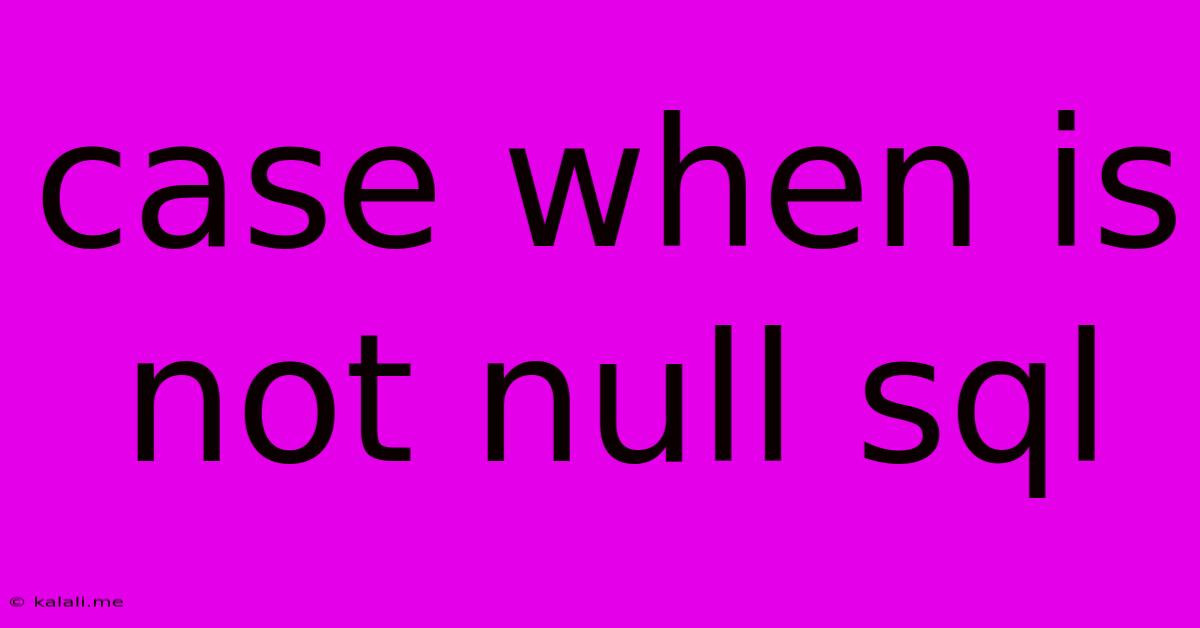Case When Is Not Null Sql
Kalali
Jun 01, 2025 · 3 min read

Table of Contents
Mastering the SQL CASE WHEN IS NOT NULL Statement: A Comprehensive Guide
The CASE WHEN IS NOT NULL statement in SQL is a powerful tool for handling conditional logic within your queries. It allows you to perform different actions based on whether a specific column contains a null value or a non-null value. This is crucial for data manipulation, cleaning, and reporting, enabling you to create more robust and insightful queries. This guide provides a detailed explanation, practical examples, and best practices for using this essential SQL construct.
Understanding NULL Values in SQL
Before diving into CASE WHEN IS NOT NULL, it's crucial to understand the concept of NULL in SQL. A NULL value represents the absence of a value, not an empty string or zero. Standard comparison operators like =, !=, >, < will always return FALSE when comparing a value to NULL. This is why special functions like IS NULL and IS NOT NULL are essential for handling NULL values effectively.
The Syntax of CASE WHEN IS NOT NULL
The basic syntax of a CASE statement incorporating IS NOT NULL is as follows:
CASE
WHEN column_name IS NOT NULL THEN result_if_not_null
ELSE result_if_null
END as alias_name
CASE: Starts the conditional statement.WHEN column_name IS NOT NULL: This condition checks if the specified column (column_name) contains a non-null value.THEN result_if_not_null: If the condition is true (the column is not NULL), this expression is evaluated and returned.ELSE result_if_null: If the condition is false (the column is NULL), this expression is evaluated and returned. This part is optional; if omitted,NULLwill be returned when the condition is false.END as alias_name: Ends theCASEstatement and assigns an alias to the resulting column.
Practical Examples
Let's illustrate with some examples using a hypothetical customers table with columns customer_id, name, and email.
Example 1: Replacing NULL email addresses with a default value.
Suppose we want to replace NULL email addresses with "[email protected]":
SELECT
customer_id,
name,
CASE
WHEN email IS NOT NULL THEN email
ELSE '[email protected]'
END as customer_email
FROM
customers;
Example 2: Categorizing customers based on email presence.
We can categorize customers into those with and without email addresses:
SELECT
customer_id,
name,
CASE
WHEN email IS NOT NULL THEN 'Has Email'
ELSE 'No Email'
END as email_status
FROM
customers;
Example 3: Using CASE with multiple conditions.
We can extend this to include more complex scenarios. For example, let's assign different categories based on the length of the email address:
SELECT
customer_id,
name,
CASE
WHEN email IS NULL THEN 'No Email'
WHEN LENGTH(email) < 10 THEN 'Short Email'
ELSE 'Long Email'
END as email_category
FROM
customers;
Best Practices and Considerations
- Readability: Keep your
CASEstatements concise and easy to understand. Break down complex logic into smaller, more manageable pieces. - Performance: While
CASEstatements are generally efficient, excessively complex statements can impact performance. Consider optimizing your queries if performance becomes an issue. - Null Handling: Always explicitly handle NULL values. Avoid relying on implicit NULL behavior, which can lead to unexpected results.
- Error Handling: For robust error handling, always anticipate potential issues and include appropriate error handling mechanisms within your
CASEstatements.
The CASE WHEN IS NOT NULL statement is a fundamental tool for any SQL developer. By mastering its usage, you can write more efficient, readable, and powerful SQL queries, leading to improved data management and analysis. Remember to always prioritize clear code and efficient database operations when implementing conditional logic in your SQL scripts.
Latest Posts
Latest Posts
-
How Far Can I Drive Without A Coolant Reservoir
Jun 03, 2025
-
Brompton Pump Mounting Problems Bolts Too Short
Jun 03, 2025
-
How To Put In Closet Doors
Jun 03, 2025
-
Water Coming Out Of My Tailpipe
Jun 03, 2025
-
Can You Track A Visa Gift Card
Jun 03, 2025
Related Post
Thank you for visiting our website which covers about Case When Is Not Null Sql . We hope the information provided has been useful to you. Feel free to contact us if you have any questions or need further assistance. See you next time and don't miss to bookmark.